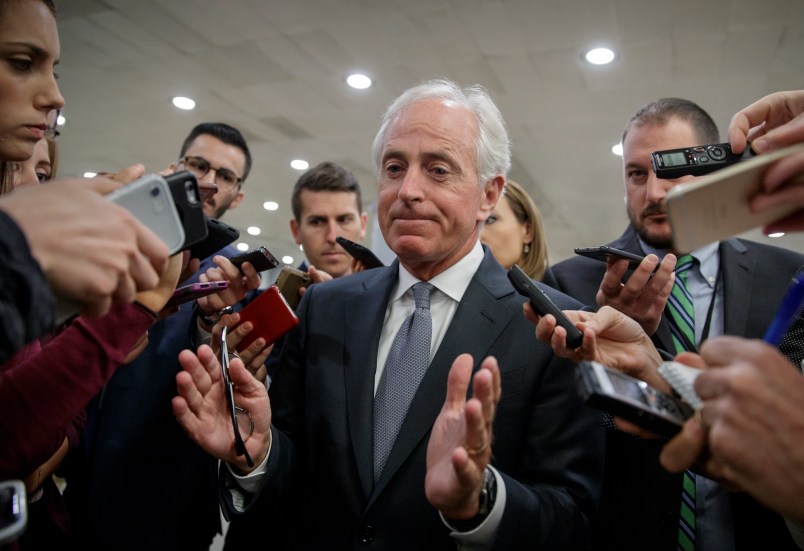The Republican tax bill sailed out of committee Tuesday after former hold-out Sen. Bob Corker (R-TN) secured a “verbal promise” from President Trump to include a “trigger” mechanism in the bill that would undo some of the bill’s tax cuts if they—as predicted—balloon the federal deficit in the coming years.
But the wheels are already coming off the car.
Uncertainty about exactly what tax cuts would fall under the trigger and the length of time before it goes into effect, along with staunch opposition to the idea from fellow Republicans and outside conservative groups, could kill the idea before it ever makes it into the bill. With a vote just a day away and the details of the proposal still shrouded in secrecy, senators are agonizing over siding with the deficit hawks demanding the trigger or the growing band of lawmakers insisting no trigger is necessary because the tax cuts will create wild economic growth to fill the trillion-plus dollar deficit.
According to information leaked to Bloomberg News, one version of the trigger currently under discussion involves $350 billion in tax hikes beginning in 2022 if the promised growth fails to materialize. The exact size of the tax increase would be determined by the size of the economic shortfall. Another version detailed by Politico involved hiking the corporate tax rate by 1 percent if GDP doesn’t grow an average of 0.4 percent over the five years after the law is enacted.
A final version may never see the light of day.
At least four senators – Dean Heller (R-NV), Thom Tillis (R-NC), Chuck Grassley (R-IA), and John Kennedy (R-LA) – say they’re opposed to the idea of a deficit trigger. Grassley told TPM on Tuesday that it would inject uncertainty into the economy. On the House side, several lawmakers have also come out against the idea, and powerful conservative advocacy groups are mobilizing as well.
“The idea of a ‘tax hike trigger’ should be rejected on its merits,” wrote Club for Growth President David McIntosh on Wednesday. “It will have harmful impacts on American businesses and undermine any economic growth potential in this tax reform bill because businesses will not invest due to the possibility of a higher tax rate.”
Instead of a trigger that raises taxes if the federal deficit becomes too deep, the Koch brothers-funded group has an alternative proposal.
“Here’s an idea. How about cutting spending?” McIntosh wrote. “A spending cut trigger would be a far better idea.”
Americans for Prosperity joined the chorus, writing: “Champions of pro-growth, comprehensive tax reform should oppose any attempt to include this harmful provision.”
Neither group addressed the question of why, if they are so convinced the tax cuts would create plenty of economic growth and wouldn’t grow the deficit, they oppose a backstop measure that would only kick in in the event that fails to happen.







Which has never happened in the history of massive tax cuts.
The deficit is only useful to the GOP as a tool to reject Democratic initiatives and to employ as a pretext to cut Medicaid, Medicare, and Social Security.
Expected massive economic growth?
The god damn emperor has no clothes. This approach does not work, it has been proven numerous times it does not work.
Numerous billionaires and millionaires have stated it will not work and oppose it.
So. Let’s try it again.
Welfare for the rich 5.0.
HOW TO SPOT THE GOP’S BIG TAX BILL LIE
Excerpt:
5. They’re all piled into the getaway car wearing their robber masks. In some ways, the most profound and persuasive evidence that Republicans are poised to plunder the treasury for the rich requires no scrutiny of the contents of their tax bills at all. Rather, one could simply observe that if Republicans weren’t poised to plunder the treasury for the rich, they’d be behaving rather differently.
If these were the kinds of tax bills Paul Ryan and others describe, Republicans wouldn’t be vulnerable to criticism, nor proceeding in a rushed and partisan fashion. A bona fide middle-class tax cut would pass overwhelmingly. A revenue- and distributionally-neutral tax reform initiative would likewise be a bipartisan undertaking, and produce legislation that congressional leaders would unveil upon completion of painstaking negotiations, and not a moment sooner.
The reason these bills are advancing along party lines, through an arcane legislative process that allows partisan majorities to avoid filibusters, is because they don’t help the middle class and don’t fix major problems with the tax code. Republicans are acting like they’re about to get caught lining rich people’s pockets, because that’s exactly what they’re up to.
The GOP Tax Plan Might Make Sense — If Recessions Didn’t Exist
Excerpt:
This is why it’s impossible for anyone to credibly claim that they want to reduce the national debt and, also, pass the GOP’s tax plan. There is no fiscally conservative argument for adding hundreds of billions of dollars to the deficit at a time when the stock market is at record highs and unemployment near record lows. If Republicans cared about the debt, they would be pushing to cut it now — austerity will be far more painful when the economy (inevitably) falls back into recession.
But the GOP, writ large, does not care about the deficit. The party’s primary concern is ensuring that corporate America gets a return on its political investments. Republicans aren’t pushing a giant, regressive, deficit-financed business tax cut because they think such a policy meets the specific needs of the 2017 economy. They’re pushing it because 2017 is the year they happened to gain full control of the federal government; they lack the votes to pass significant spending cuts or middle-class tax increases; and their party exists to consolidate wealth and power into the hands of its well-heeled benefactors.